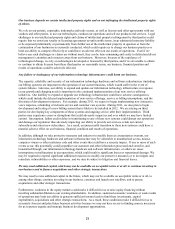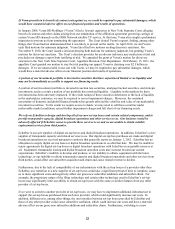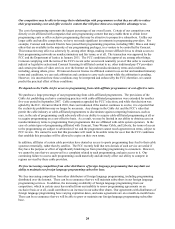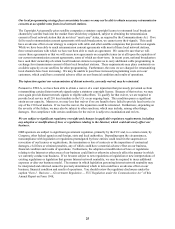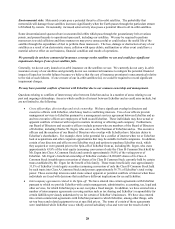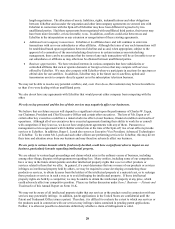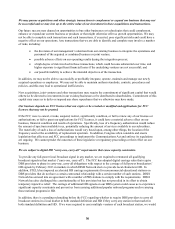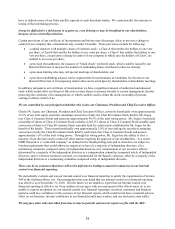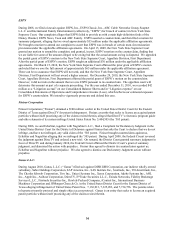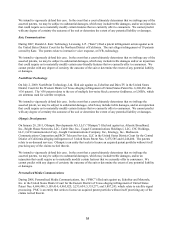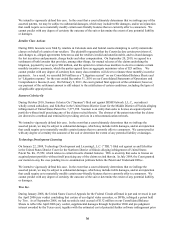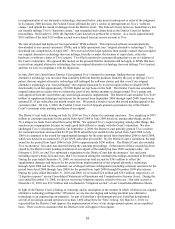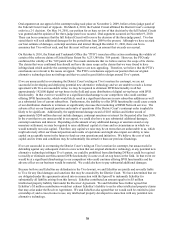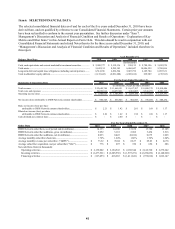Dish Network 2010 Annual Report Download - page 38
Download and view the complete annual report
Please find page 38 of the 2010 Dish Network annual report below. You can navigate through the pages in the report by either clicking on the pages listed below, or by using the keyword search tool below to find specific information within the annual report.31
31
have to dedicate more of our finite satellite capacity to each broadcast station. We cannot predict the outcome or
timing of that rulemaking process.
It may be difficult for a third party to acquire us, even if doing so may be beneficial to our shareholders,
because of our ownership structure.
Certain provisions of our certificate of incorporation and bylaws may discourage, delay or prevent a change in
control of our company that a shareholder may consider favorable. These provisions include the following:
• a capital structure with multiple classes of common stock: a Class A that entitles the holders to one vote
per share, a Class B that entitles the holders to ten votes per share, a Class C that entitles the holders to one
vote per share, except upon a change in control of our company in which case the holders of Class C are
entitled to ten votes per share;
• a provision that authorizes the issuance of “blank check” preferred stock, which could be issued by our
Board of Directors to increase the number of outstanding shares and thwart a takeover attempt;
• a provision limiting who may call special meetings of shareholders; and
• a provision establishing advance notice requirements for nominations of candidates for election to our
Board of Directors or for proposing matters that can be acted upon by shareholders at shareholder meetings.
In addition, pursuant to our certificate of incorporation we have a significant amount of authorized and unissued
stock which would allow our Board of Directors to issue shares to persons friendly to current management, thereby
protecting the continuity of its management, or which could be used to dilute the stock ownership of persons
seeking to obtain control of us.
We are controlled by one principal stockholder who is also our Chairman, President and Chief Executive Officer.
Charles W. Ergen, our Chairman, President and Chief Executive Officer, currently beneficially owns approximately
53.6% of our total equity securities (assuming conversion of only the Class B Common Stock held by Mr. Ergen
into Class A Common Stock) and possesses approximately 90.5% of the total voting power. Mr. Ergen’s beneficial
ownership of shares of Class A Common Stock excludes 4,245,151 shares of Class A Common Stock issuable upon
conversion of shares of Class B Common Stock currently held by certain trusts established by Mr. Ergen for the
benefit of his family. These trusts beneficially own approximately 2.0% of our total equity securities (assuming
conversion of only the Class B Common Stock held by such trusts into Class A Common Stock) and possess
approximately 1.6% of the total voting power. Through his voting power, Mr. Ergen has the ability to elect a
majority of our directors and to control all other matters requiring the approval of our stockholders. As a result,
DISH Network is a “controlled company” as defined in the Nasdaq listing rules and is, therefore, not subject to
Nasdaq requirements that would otherwise require us to have (i) a majority of independent directors; (ii) a
nominating committee composed solely of independent directors; (iii) compensation of our executive officers
determined by a majority of the independent directors or a compensation committee composed solely of independent
directors; and (iv) director nominees selected, or recommended for the Board’s selection, either by a majority of the
independent directors or a nominating committee composed solely of independent directors.
There can be no assurance that there will not be deficiencies leading to material weaknesses in our internal
control over financial reporting.
We periodically evaluate and test our internal control over financial reporting to satisfy the requirements of Section
404 of the Sarbanes-Oxley Act. Our management has concluded that our internal control over financial reporting
was effective as of December 31, 2010. If in the future we are unable to report that our internal control over
financial reporting is effective (or if our auditors do not agree with our assessment of the effectiveness of, or are
unable to express an opinion on, our internal control over financial reporting), investors, customers and business
partners could lose confidence in the accuracy of our financial reports, which could in turn have a material adverse
effect on our business, investor confidence in our financial results may weaken, and our stock price may suffer.
We may face other risks described from time to time in periodic and current reports we file with the SEC.


